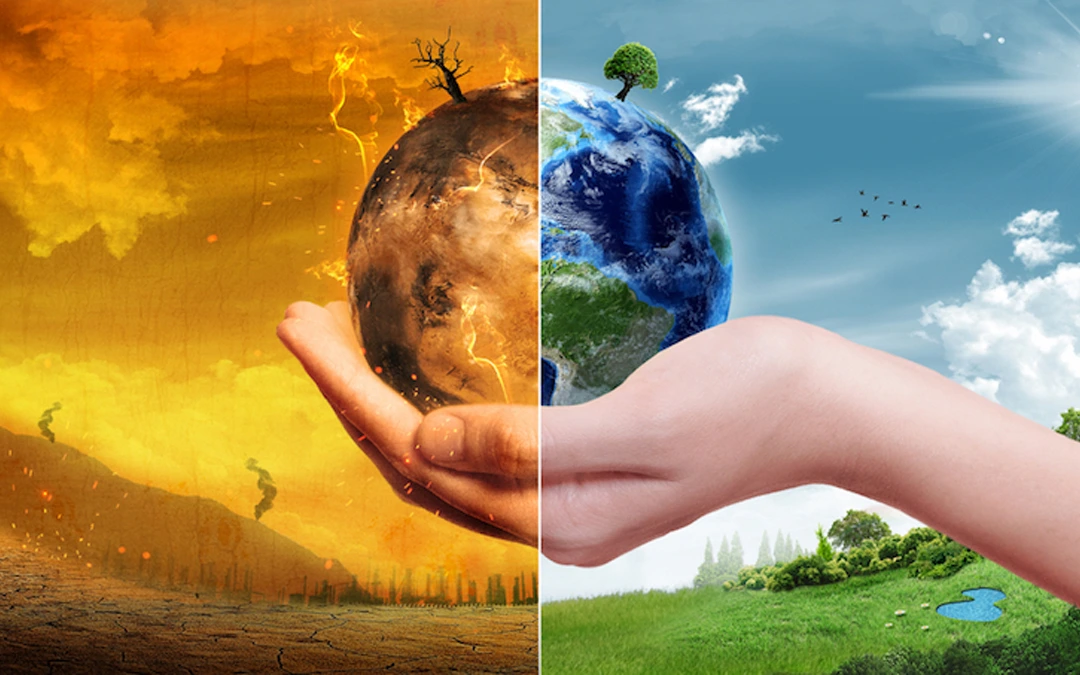Climate change is not some distant possibility. It is an assault already underway, invading homes, cities, and economies. The most underprivileged are bearing its brunt, while those more fortunate are able, for now, to afford negligence. The facts are undeniable, yet denial persists. The issue is not lack of education, but lack of honesty.
What is the Proof of Climate Change?
The evidence of climate change is visible, documented, and undeniable. It does not lie in subtle theories but in events unfolding across the world. Research reports, scientific data, and news outlets have all been highlighting the changes, which are happening at a pace even faster than scientists had anticipated.
For instance, global estimates projected an average rise of 1.3° ± 0.4° by 2025. Scientists usually present conservative numbers, avoiding sensationalism. Yet, even these cautious figures are being exceeded. Extreme weather events — once considered rare — now occur with alarming regularity.
In the United States, January brought wildfires in California due to excessive heat, dried forest beds, unusual leaf fall, and high wind speeds. Heat means more energy, and more energy means stronger winds. The result was catastrophic. Simultaneously, the East Coast endured unprecedented heat waves, with nights failing to cool.
In India, the first four months of the year were among the hottest in over a century, followed by one of the wettest months ever recorded. Such extremes disrupted the economy, public health, and employment. The informal sector, which depends heavily on outdoor labor, was paralyzed. Agriculture — still employing over half the Indian workforce — faced additional challenges.
Globally, the average temperature has crossed 1.5°C above pre-industrial levels. Yet this rise is uneven. The Indian subcontinent, including India, Pakistan, and Bangladesh, has experienced temperature variations nearly double the global average. In April this year, north India recorded 5–8°C above seasonal norms.
The impact on life is severe. Humans, animals, and plants are designed to function within narrow temperature ranges. Exceeding those thresholds means death, collapse of reproduction, or population shrinkage. Coral reefs — hubs of biodiversity — now face 80–90% bleaching. Their once-vibrant ecosystems have been reduced to lifeless whiteness.
Wildfires in California, Greece, and Australia, storms in China and Mexico, and NASA’s report confirming that droughts and floods have doubled in the last two decades are further proof. India alone recorded 44,000 heat stroke cases this year — the highest ever, according to the World Meteorological Organization.
A study by the Council on Energy, Environment and Water revealed that 57% of Indian districts — housing 76% of the population — are at high risk of extreme heat. Rising night-time humidity worsens the danger, as relief from daytime peaks is denied.
The evidence is everywhere: in households, in cities, in hospitals, and in farmlands. To deny it is not ignorance but deliberate self-deception — a negligence bordering on criminality.
Is Climate Change Just a Pessimistic View?
Some dismiss climate science as pessimism and insist that human beings can adapt to all challenges. But climate change is not about belief or optimism — it is about physics. Ice cannot survive 50°C regardless of belief. Human beings cannot survive conditions far outside their evolutionary design.
The picture presented is not pessimistic but realistic. More than 75% of wildlife has been obliterated in just 50 years, much of it due to climate change. This is the sixth mass extinction, unfolding before our eyes. To call this pessimism is like calling a thermometer pessimistic for reading a fever at 103°F.
Global action has been woefully inadequate. The Paris Agreement of 2015 sought to reduce emissions to 2010 levels, ideally even 1990 levels. Instead, 2019 emissions reached 59 gigatons of CO₂ equivalents, and by 2025, emissions are even higher. Instead of a 44% reduction by 2030, as targeted, the world is on track for an increase.
This trajectory pushes global average temperatures toward a rise of more than 3°C. In some regions, like India, this could mean spikes of 10–15°C. Optimism has no place when facts point toward catastrophe.
Does Economic Growth Justify Neglecting Climate Change?
The claim that addressing climate change would slow economic growth is dangerously shortsighted. Ignoring climate change is like trying to drive with all four tires punctured. Economic growth cannot be sustained in the absence of environmental stability.
India is particularly vulnerable. Agriculture, on which over half the population depends, is at the mercy of disrupted monsoons and melting glaciers. Crops will fail without reliable rainfall or river flows. Farmers, insects responsible for pollination, and entire ecosystems are at risk.
Manufacturing and services are equally vulnerable. Textiles and other industries rely on agricultural raw materials. The service sector thrives only when people have disposable income, something impossible if food and water are scarce.
Urban centers are also at risk. Mumbai, the nation’s financial hub, faces rising sea levels that could submerge parts of the city. Chennai and Kolkata face similar threats. Delhi, the political capital, faces extreme heat waves.
The economic costs of climate change extend to healthcare as well. Heat waves, heart disease, cancer, tuberculosis, viral outbreaks, and pandemics will become more frequent. Viruses long frozen in ice sheets or permafrost are being released as glaciers melt, posing threats against which humans have no immunity. COVID-19 already showed how economic growth can collapse in the face of a global health crisis. Thousands more such viruses lie dormant, waiting for release.
The melting of glaciers reveals chilling reminders — even debris from mid-20th century airplane crashes in the Alps is now emerging. If aircraft remnants can reappear after decades under ice, so can ancient viruses.
What economy will survive when agriculture collapses, industries fail, services dry up, and cities sink under water? What growth will exist amid civil unrest caused by mass displacement, water wars, and food shortages?
Should Environmental Education Be Compulsory?
The science of climate change is simple. Even high school students can understand it. The problem lies not in comprehension but in acceptance. People often know the facts but prefer denial because it is convenient.
The root issue is not lack of education but lack of inner honesty. Education systems teach external knowledge but fail to nurture integrity — the willingness to face uncomfortable truths. This allows even highly educated individuals to become climate deniers.
Unless societies instill honesty, courage, and responsibility in their young, denial will persist. Climate change will continue its assault, striking not just the environment but the very foundation of human survival.
Discover more empowering stories and insightful content like this on YOUxTalks, your go-to destination for inspiration and knowledge.
Follow YOUxTalks on Instagram: https://www.instagram.com/youxtalks











